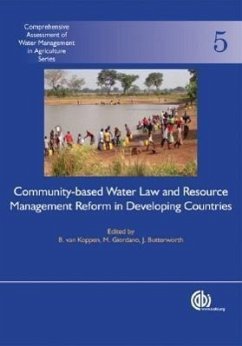The lack of sufficient access to clean water is a common problem faced by communities, efforts to alleviate poverty and gender inequality and improve economic growth in developing countries. While reforms have been implemented to manage water resources, these have taken little notice of how people use and manage their water and have had limited effect at the ground level. On the other hand, regulations developed within communities are livelihood-oriented and provide incentives for collective action but they can also be hierarchal, enforcing power and gender inequalities. This book shows how bringing together the strengths of community-based laws rooted in user participation and the formalized legal systems of the public sector, water management regimes will be more able to reach their goals.
Hinweis: Dieser Artikel kann nur an eine deutsche Lieferadresse ausgeliefert werden.
Hinweis: Dieser Artikel kann nur an eine deutsche Lieferadresse ausgeliefert werden.







